HanLP — 汉字转拼音,简繁转换 -- JAVA
HanLP 在汉字转拼音时,可以解决多音字问题,显示输出声调,声母、韵母,通过训练语料库,
本文代码为《自然语言处理入门》配套版本 HanLP-1.7.5
HanLP 里,汉字转简单,简体繁体转换,都用到了 双数组字典树 (Double-array Trie)、Aho-Corasick DoubleArrayTire 算法 ACDAT - 基于双数组字典树的AC自动机 需要先熟悉
对重载不是重任进行转拼音,效果如下:
原文:重载不是重任
拼音(数字音调):chong2,zai3,bu2,shi4,zhong4,ren4,
拼音(符号音调):chóng,zǎi,bú,shì,zhòng,rèn,
拼音(无音调):chong,zai,bu,shi,zhong,ren,
声调:2,3,2,4,4,4,
声母:ch,z,b,sh,zh,r,
韵母:ong,ai,u,i,ong,en,
输入法头:ch,z,b,sh,zh,r,
语料库
pinyin.txt
一丁点儿=yi1,ding1,dian3,er5
一不小心=yi1,bu4,xiao3,xin1
一丘之貉=yi1,qiu1,zhi1,he2
一丝不差=yi4,si1,bu4,cha1
一丝不苟=yi1,si1,bu4,gou3
一个=yi1,ge4
一个半个=yi1,ge4,ban4,ge4
一个巴掌拍不响=yi1,ge4,ba1,zhang3,pai1,bu4,xiang3
一个萝卜一个坑=yi1,ge4,luo2,bo5,yi1,ge4,keng1
一举两得=yi1,ju3,liang3,de2
一之为甚=yi1,zhi1,wei2,shen4
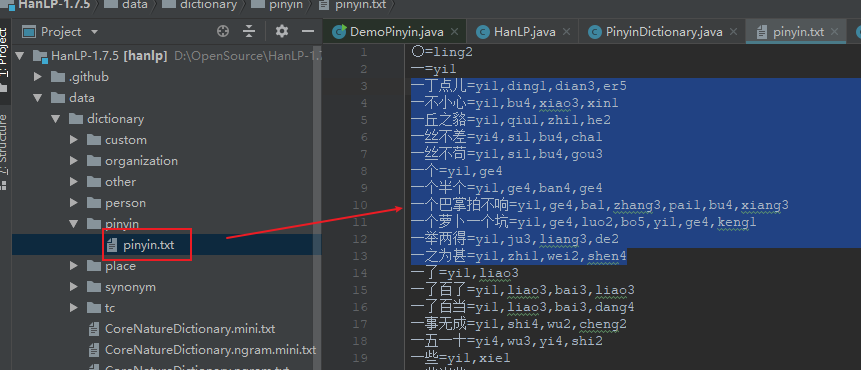
训练模型
训练,生成 pinyin.txt.bin
加载语料库
HanLP-1.7.5\src\main\java\com\hankcs\hanlp\corpus\dictionary\SimpleDictionary.java
加载语料库,每行读取,按 = 分隔,放入字典 trie 中
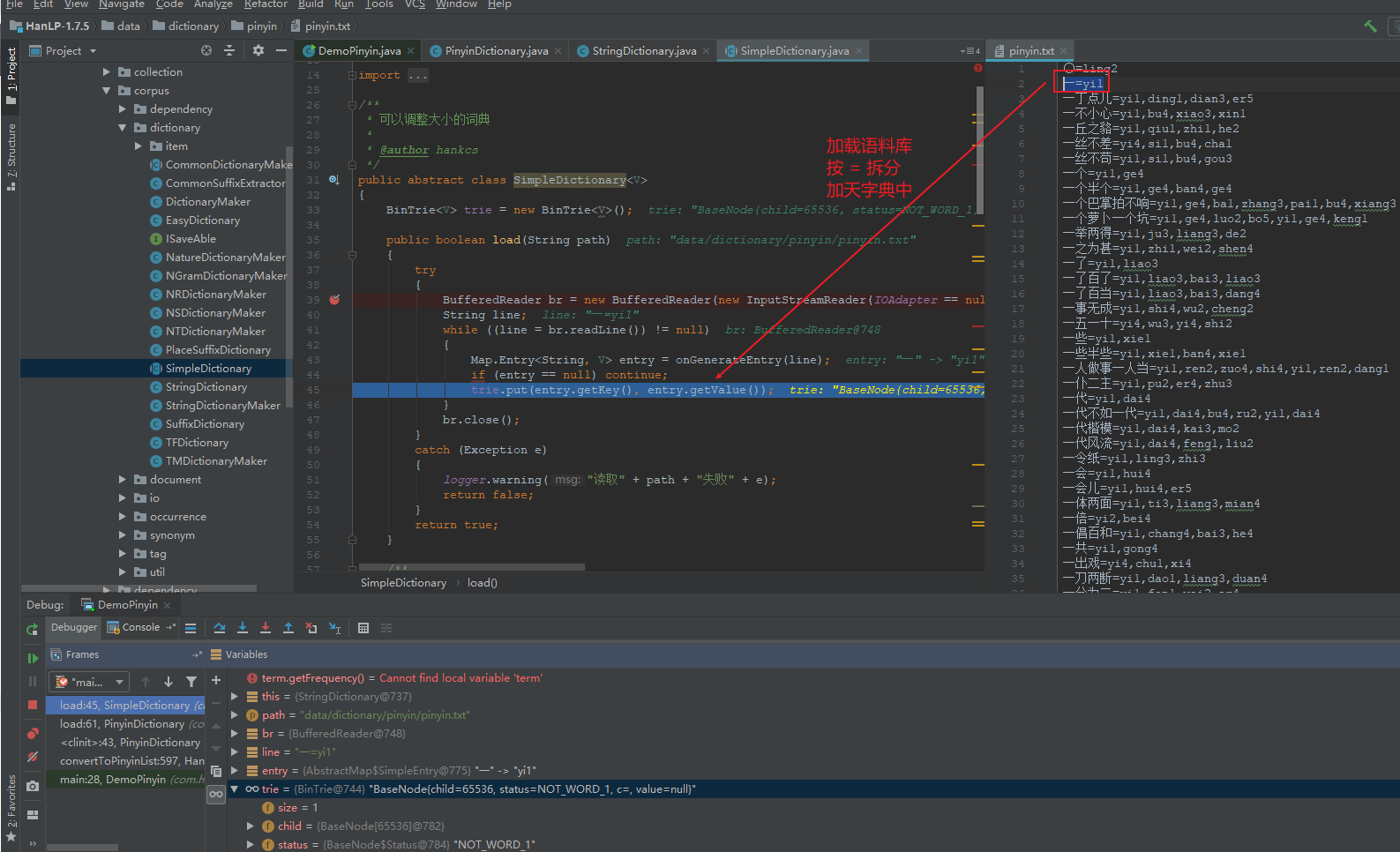
根据 = 右边每个字的拼音,通过 Pinyin.valueOf("yi1") 得到枚举中声母、韵母、音调、包含音调的字符串形式、不含音调的字符串形式
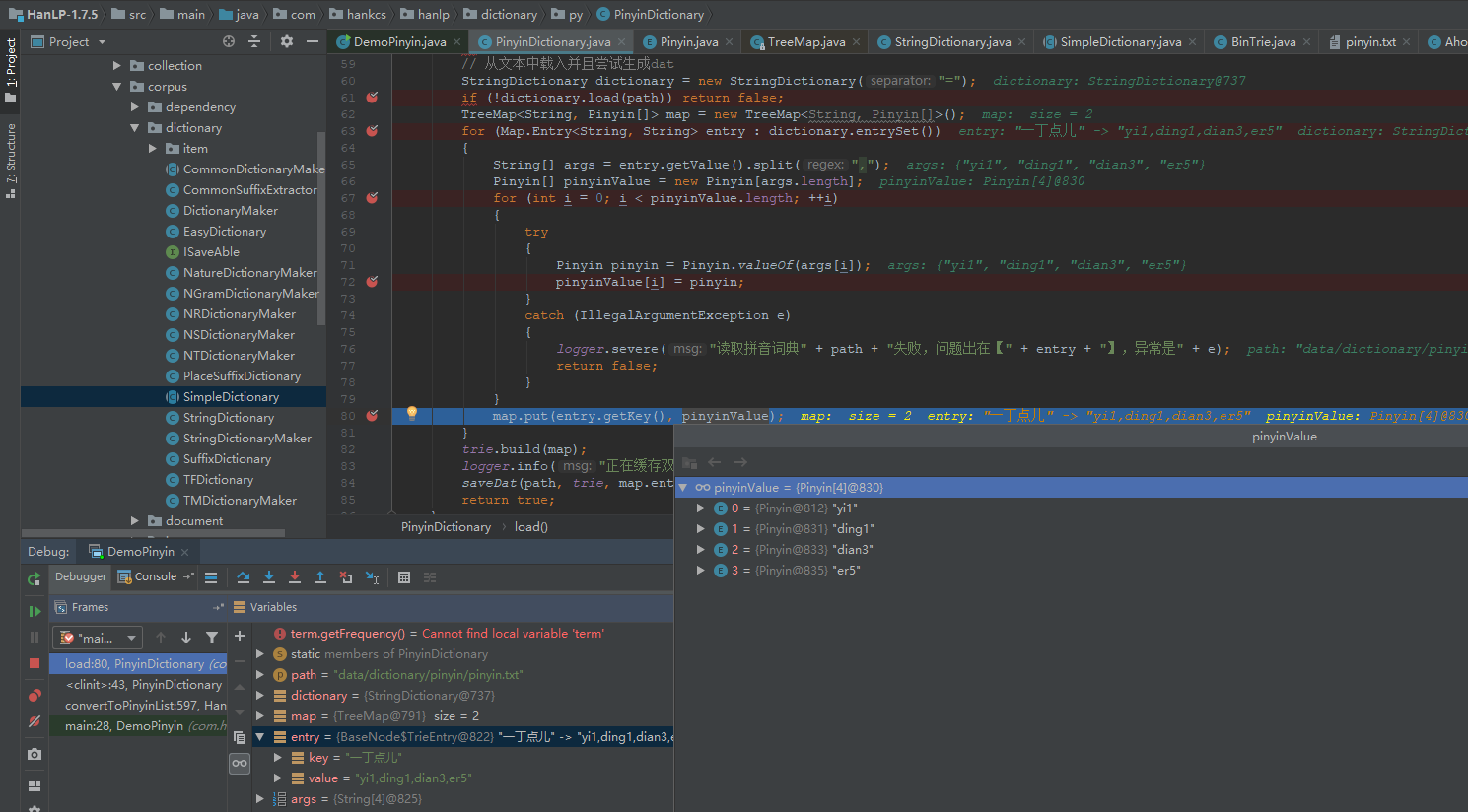
public enum Pinyin
{
a1(Shengmu.none, Yunmu.a, 1, "ā", "a", Head.a, 'a'),
a2(Shengmu.none, Yunmu.a, 2, "á", "a", Head.a, 'a'),
a3(Shengmu.none, Yunmu.a, 3, "ǎ", "a", Head.a, 'a'),
a4(Shengmu.none, Yunmu.a, 4, "à", "a", Head.a, 'a'),
a5(Shengmu.none, Yunmu.a, 5, "a", "a", Head.a, 'a'),
ai1(Shengmu.none, Yunmu.ai, 1, "āi", "ai", Head.a, 'a'),
ai2(Shengmu.none, Yunmu.ai, 2, "ái", "ai", Head.a, 'a'),
ai3(Shengmu.none, Yunmu.ai, 3, "ǎi", "ai", Head.a, 'a'),
ai4(Shengmu.none, Yunmu.ai, 4, "ài", "ai", Head.a, 'a'),
......
}
训练模型
将Map构建成双数组树`trie.build(map)``,可查看:HanLP — 双数组字典树 (Double-array Trie) 实现原理 -- 代码 + 图文,看不懂你来打我
public void build(TreeMap<String, V> map)
{
// 把值保存下来
v = (V[]) map.values().toArray();
l = new int[v.length];
Set<String> keySet = map.keySet();
// 构建二分trie树
addAllKeyword(keySet);
// 在二分trie树的基础上构建双数组trie树
buildDoubleArrayTrie(keySet);
used = null;
// 构建failure表并且合并output表
constructFailureStates();
rootState = null;
loseWeight();
}
保存模型
通过 saveDat(path, trie, map.entrySet()); 生成模型文件
static boolean saveDat(String path, AhoCorasickDoubleArrayTrie<Pinyin[]> trie, Set<Map.Entry<String, Pinyin[]>> entrySet)
{
try
{
DataOutputStream out = new DataOutputStream(new BufferedOutputStream(IOUtil.newOutputStream(path + Predefine.BIN_EXT)));
out.writeInt(entrySet.size());
for (Map.Entry<String, Pinyin[]> entry : entrySet)
{
Pinyin[] value = entry.getValue();
out.writeInt(value.length);
for (Pinyin pinyin : value)
{
out.writeInt(pinyin.ordinal());
}
}
trie.save(out);
out.close();
}
catch (Exception e)
{
logger.warning("缓存值dat" + path + "失败");
return false;
}
return true;
}
/**
* 持久化
*
* @param out 一个DataOutputStream
* @throws Exception 可能的IO异常等
*/
public void save(DataOutputStream out) throws Exception
{
out.writeInt(size);
for (int i = 0; i < size; i++)
{
out.writeInt(base[i]);
out.writeInt(check[i]);
out.writeInt(fail[i]);
int output[] = this.output[i];
if (output == null)
{
out.writeInt(0);
}
else
{
out.writeInt(output.length);
for (int o : output)
{
out.writeInt(o);
}
}
}
out.writeInt(l.length);
for (int length : l)
{
out.writeInt(length);
}
}
预测
加载模型
// path = data/dictionary/pinyin/pinyin.txt
static boolean loadDat(String path)
{
ByteArray byteArray = ByteArray.createByteArray(path + Predefine.BIN_EXT);
if (byteArray == null) return false;
int size = byteArray.nextInt();
Pinyin[][] valueArray = new Pinyin[size][];
for (int i = 0; i < valueArray.length; ++i)
{
int length = byteArray.nextInt();
valueArray[i] = new Pinyin[length];
for (int j = 0; j < length; ++j)
{
valueArray[i][j] = pinyins[byteArray.nextInt()];
}
}
if (!trie.load(byteArray, valueArray)) return false;
return true;
}
public boolean load(ByteArray byteArray, V[] value)
{
if (byteArray == null) return false;
size = byteArray.nextInt();
base = new int[size + 65535]; // 多留一些,防止越界
check = new int[size + 65535];
fail = new int[size + 65535];
output = new int[size + 65535][];
int length;
for (int i = 0; i < size; ++i)
{
base[i] = byteArray.nextInt();
check[i] = byteArray.nextInt();
fail[i] = byteArray.nextInt();
length = byteArray.nextInt();
if (length == 0) continue;
output[i] = new int[length];
for (int j = 0; j < output[i].length; ++j)
{
output[i][j] = byteArray.nextInt();
}
}
length = byteArray.nextInt();
l = new int[length];
for (int i = 0; i < l.length; ++i)
{
l[i] = byteArray.nextInt();
}
v = value;
return true;
}
计算
通过 HanLP — Aho-Corasick DoubleArrayTire 算法 ACDAT - 基于双数组字典树的AC自动机 找出汉字的拼音
// HanLP-1.7.5\src\main\java\com\hankcs\hanlp\dictionary\py\PinyinDictionary.java
protected static List<Pinyin> segLongest(char[] charArray, AhoCorasickDoubleArrayTrie<Pinyin[]> trie, boolean remainNone)
{
final Pinyin[][] wordNet = new Pinyin[charArray.length][];
trie.parseText(charArray, new AhoCorasickDoubleArrayTrie.IHit<Pinyin[]>()
{
@Override
public void hit(int begin, int end, Pinyin[] value)
{
int length = end - begin;
if (wordNet[begin] == null || length > wordNet[begin].length)
{
wordNet[begin] = length == 1 ? new Pinyin[]{value[0]} : value;
}
}
});
List<Pinyin> pinyinList = new ArrayList<Pinyin>(charArray.length);
for (int offset = 0; offset < wordNet.length; )
{
if (wordNet[offset] == null)
{
if (remainNone)
{
pinyinList.add(Pinyin.none5);
}
++offset;
continue;
}
for (Pinyin pinyin : wordNet[offset])
{
pinyinList.add(pinyin);
}
offset += wordNet[offset].length;
}
return pinyinList;
}
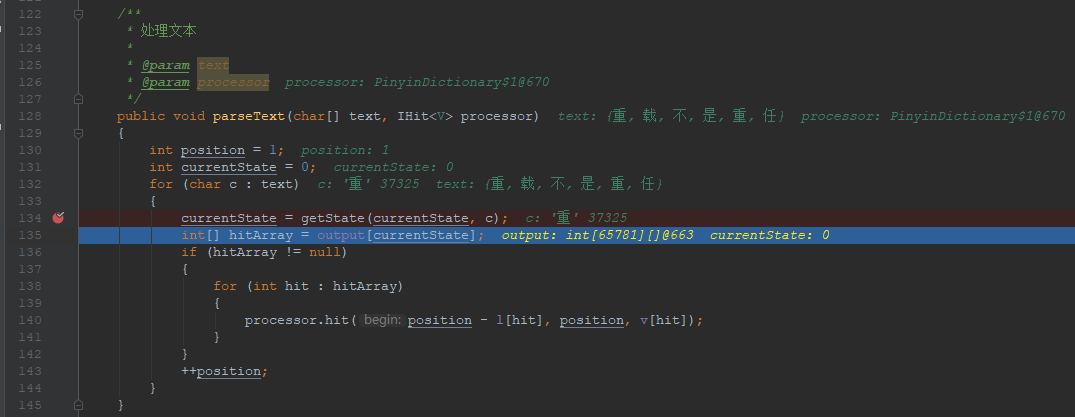
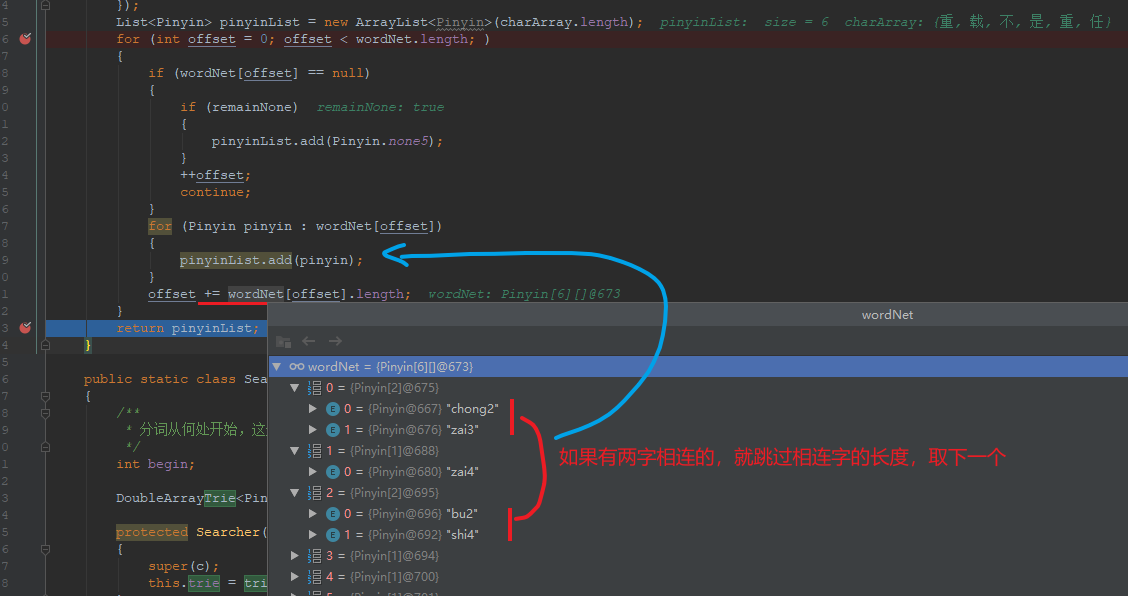
调用
public static void main(String[] args)
{
String text = "重载不是重任";
List<Pinyin> pinyinList = HanLP.convertToPinyinList(text);
System.out.print("原文:");
for (char c : text.toCharArray())
{
System.out.printf("%c", c);
}
System.out.println();
System.out.print("拼音(数字音调):");
for (Pinyin pinyin : pinyinList)
{
System.out.printf("%s,", pinyin);
}
System.out.println();
System.out.print("拼音(符号音调):");
for (Pinyin pinyin : pinyinList)
{
System.out.printf("%s,", pinyin.getPinyinWithToneMark());
}
System.out.println();
System.out.print("拼音(无音调):");
for (Pinyin pinyin : pinyinList)
{
System.out.printf("%s,", pinyin.getPinyinWithoutTone());
}
System.out.println();
System.out.print("声调:");
for (Pinyin pinyin : pinyinList)
{
System.out.printf("%s,", pinyin.getTone());
}
System.out.println();
System.out.print("声母:");
for (Pinyin pinyin : pinyinList)
{
System.out.printf("%s,", pinyin.getShengmu());
}
System.out.println();
System.out.print("韵母:");
for (Pinyin pinyin : pinyinList)
{
System.out.printf("%s,", pinyin.getYunmu());
}
System.out.println();
System.out.print("输入法头:");
for (Pinyin pinyin : pinyinList)
{
System.out.printf("%s,", pinyin.getHead());
}
System.out.println();
}
输出:
原文:重载不是重任
拼音(数字音调):chong2,zai3,bu2,shi4,zhong4,ren4,
拼音(符号音调):chóng,zǎi,bú,shì,zhòng,rèn,
拼音(无音调):chong,zai,bu,shi,zhong,ren,
声调:2,3,2,4,4,4,
声母:ch,z,b,sh,zh,r,
韵母:ong,ai,u,i,ong,en,
输入法头:ch,z,b,sh,zh,r,
本文来自博客园,作者:VipSoft 转载请注明原文链接:https://www.cnblogs.com/vipsoft/p/17972448

 浙公网安备 33010602011771号
浙公网安备 33010602011771号